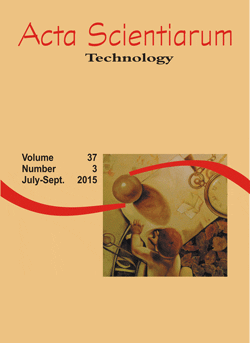<b>Synthesis of carboxylate complexes and evaluation of their catalytic activities for polyesterification of castor oil (<i>Ricinum communis</i>) with terephthalic acid
DOI:
https://doi.org/10.4025/actascitechnol.v37i3.25056Palavras-chave:
polyester, step-growth polymerization, ricinoleate metal complexes, homogeneous Catalysis.Resumo
Â
The use of castor oil (Ricinus communis) has been pointed out as an interesting alternative to produce several polymers obtained from step-growth polymerization and are suitable to be used as resins and coatings. The ricinoleate metal complexes Ni[C17H34(OH)COO]2, Sn[C17H34(OH)COO]2, Co[C17H34(OH)COO]2 and Fe[C17H34(OH)COO]2 have been prepared and used as catalyst precursors for polyesterification of castor oil and terephthalic acid (TFA). The observed catalytic activity decreased in the order: Fe[C17H34(OH)COO]2 > Co[C17H34(OH)COO]2 > Sn[C17H34(OH)COO]2 > Ni[C17H34(OH)COO]2. The new polymeric materials did not show homogeneity in their chains, as indicated by their high polydispersity. Indeed, the polydispersity index value varied from 5.49 for the polymer produced in the presence of the nickel complex to 12.42 for these prepared with the cobalt compound. On the other hand, the final material presented high molecular weight, being the lower value (Mw = 13400 Da) observed for the polymer prepared with the nickel complex and the highest (Mw = 36400 Da) verified for the one obtained with the cobalt compound. It was observed only a glass transition temperature for all the materials, suggesting an amorphous structure of polymeric chains.
Â
Downloads
Downloads
Publicado
Como Citar
Edição
Seção
Licença
DECLARAÇíO DE ORIGINALIDADE E DIREITOS AUTORAIS
Declaro que o presente artigo é original, não tendo sido submetido í publicação em qualquer outro periódico nacional ou internacional, quer seja em parte ou em sua totalidade.
Os direitos autorais pertencem exclusivamente aos autores. Os direitos de licenciamento utilizados pelo periódico é a licença Creative Commons Attribution 4.0 (CC BY 4.0): são permitidos o compartilhamento (cópia e distribuição do material em qualqer meio ou formato) e adaptação (remix, transformação e criação de material a partir do conteúdo assim licenciado para quaisquer fins, inclusive comerciais.
Recomenda-se a leitura desse link para maiores informações sobre o tema: fornecimento de créditos e referências de forma correta, entre outros detalhes cruciais para uso adequado do material licenciado.



















